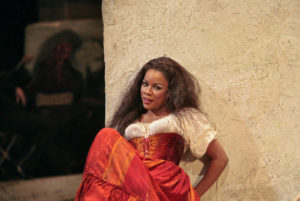
Artist Profile: Denyce Graves, An Essential America Mezzo
By David SalazarDenyce Graves, born on March 7, 1964, is one of the iconic American mezzos of the late 1900s.
She was born in Washington D.C. and graduated from the Duke Ellington School of the arts in 1981. Then she studied voice at the Oberlin Conservatory, followed by the New England Conservatory. She would then work further at the Wolf Trap Opera Company, followed by the Houston Opera Studio.
In 1995, she made her big Met debut, launching a major career that has seen her perform all over the United States and Europe including the Wiener Staatsoper, Royal Opera House, Covent Garden, San Francisco Opera, Opéra National de Paris, Lyric Opera of Chicago, Washington National Opera, Bayerische Staatsoper, Arena di Verona, Deutsche Oper Berlin, Opernhaus Zürich, Teatro Real in Madrid, Houston Grand Opera, The Dallas Opera, Teatro Colón in Buenos Aires, Los Angeles Opera, and the Festival Maggio Musicale in Florence, among others.
But her career has transcended the opera stage. She appeared on a number of television shows, performed at the 55th Presidential Inauguration in 2005, and performed at the Washington National Cathedral for a memorial service in honor of the victims of 9/11. In 2010, she also performed in a concert in the United States Supreme Court.
She has championed a plethora of modern works, including Nico Muhly’s “Marnie” and Terence Blanchard and Michael Cristofer’s “Champion.”
Signature Roles
The mezzo made a major career out of two big roles – “Carmen” and Dalila in “Samson et Dalila.” “Carmen” was the opera of her Met Opera debut and one that she performed with the company 48 times between 1995 and 2005. She performed in London, Washington, and Los Angeles, among other cities.
Meanwhile, Dalila was the role she took on 23 times with the Met and she famously noted that it was her favorite role.
Read More on Graves
A Look At Two of Her Iconic Roles
Watch and Listen
Here is an album of French arias.
And here is another album with a wider range of repertory.
Categories
Opera Wiki

